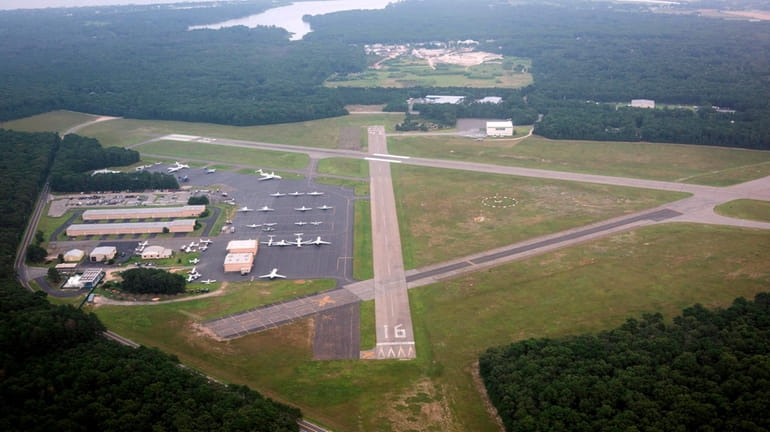Fight over East Hampton Airport returns right on time

The East Hampton Airport. Credit: ZUMA Press Inc. / Alamy Stock Photo / Bryan Smith
Daily Point
Flying east for the spring
As certain as spring bulbs popping their shoots through the earth, the wealthy return via their private aircraft to the East End. And with that, the controversy over the future of the East Hampton Airport.
So, perhaps it’s no surprise that flyers have been showing up in several thousand East Hampton residents’ mailboxes that critique the town for spending “millions of dollars on airport litigation.”
“Many in the aviation community continue to offer compromise solutions meant to strengthen the quality of life of those who live near the airport while protecting aviation safety,” the flyer says. “Let the town allocate those funds for something other than legal fees. Like Parks. And Roads.”
The flyer is coming from the East End Local Alliance, a group of aviation owner-operators that hopes to keep the airport open. Last fall, the group sponsored a set of radio ads voicing a similar sentiment.
In the interim, the town’s leadership changed hands — with new supervisor Kathee Burke-Gonzalez replacing Peter Van Scoyoc. After its radio campaign in October, the alliance decided to wait a bit to see what would happen under the town’s new leadership but quickly determined the town’s perspective on the airport hadn’t changed.
So, the campaign took flight again.
“This is a cogent message to the taxpayer and, given the fact that the new town supervisor certainly is aware of taxpayer sentiment, one would hope that there would be a response that encourages everyone to come to the table outside of the courthouse,” said alliance spokesman Gary Lewi. “Have we seen that yet? Not that I’m aware — but we’re always listening.”
But town attorney Robert M. Connelly told The Point that the alliance’s narrative is “false.”
“To be crystal clear, no taxpayer monies are being expended in defense of the litigation pertaining to the East Hampton Town Airport,” Connelly said in a statement to The Point. “The defense is being funded by revenues raised by the operation of the airport.”
According to a review of budget documents by the alliance, the town has committed to spending more than $9 million on airport-related analysis and litigation since 2021, including $1.22 million projected for 2024.
Meanwhile, the town is looking into another option: restricting air traffic at East Hampton Airport and diverting it to Montauk Airport, a much smaller, privately owned facility. An environmental review is ongoing, including a public hearing that was held Wednesday — and public comment that will continue until April 2.
— Randi F. Marshall randi.marshall@newsday.com
Pencil Point
The big race

Credit: PoliticalCartoons.com/Nikola Listes
For more cartoons, visit www.newsday.com/nationalcartoons
Reference Point
Primarily fragmented

The Newsday editorial from March 14, 1972.
The presidential primaries were underway in a very consequential election. The action had shifted to Florida, the main issue was school busing, and the Democratic front-runner in The Sunshine State was George Wallace, avowed opponent of busing and advocate of segregation.
“But no one regards him as a serious national candidate,” Newsday’s editorial board wrote on March 14, 1972, noting that the order of finish among the other 10 candidates and their respective margins of defeat would help define their future in the race.
“It’s a zany business — and, for the Democrats, in this case, a costly one in terms of money and party unity,” the board wrote.
Newsday’s board was making a case against the fragmented nature of the nation’s presidential primary system — 13 presidential elections ago. It noted that New Hampshire and Florida, the states hosting the first two primaries, were radically different in terms of their demography and issues. The system, the board wrote, “encourages a special kind of political sharpshooting. Zeroing in on a specific social, economic or ethnic group is the game.”
The board lambasted that system for its “ineffectiveness,” arguing that each of the 25 primaries that year would create “a different set of political circumstances. Ways must be found to eliminate the disorder, confusion and complexities that mark the present system and lead to impoverishment of candidates, issues and voter interest.”
The board embraced a proposal from a pair of U.S. senators — Montana Democrat Mike Mansfield and Vermont Republican George Aiken — for a constitutional amendment to create a national primary. The lawmakers proposed one vote on one day — in this case, in August — with every vote counted equally in the selection of the Democratic and Republican candidates for president.
When hearings began in June on the proposed amendment, Aiken said it would give “the individual voter everywhere an equal say in the party’s nominee” for president.
It was not a new proposal. The first bill for a national primary was introduced in Congress in 1911. More than 100 similar pieces of legislation reportedly have been introduced in Congress since then. Each met the same fate as the Mansfield-Aiken proposal. They went nowhere.
And the criticisms of the system through the years — some voters’ votes counted more than others, states whose primaries came later in the year sometimes did not matter at all since the nominee was already determined — remain unaddressed today. We have the same “fragmented” primary system with the same “disorder” and “complexities” the board complained about in 1972.
As for the board’s worry about the potential “impoverishment” of candidates, campaigns these days are more expensive than ever with millions spent on primaries and many millions more in general elections. Not that the money issue was personally relevant to Vermont’s Aiken. In his previous campaign — which also turned out to be his last, since he retired in 1974 — Aiken reportedly spent a grand total of $17.09.
— Michael Dobie michael.dobie@newsday.com, Amanda Fiscina-Wells amanda.fiscina-wells@newsday.com
Subscribe to The Point here and browse past editions of The Point here.
